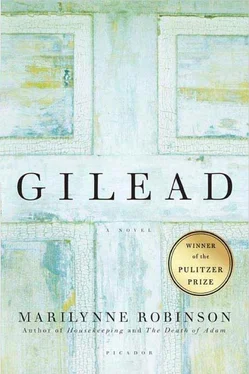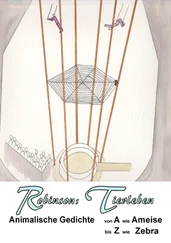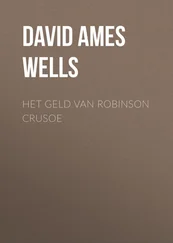And Edward was named after my uncle, with the finals, but he never liked it, and he dropped it when he left for college.
Glory has come to tell me Jack Boughton is home. He is having supper in his father’s house this very night. He will come by to pay his respects, she said, in the next day or two. I am grateful for the warning. I will use the time to prepare myself. Boughton named him for me because he thought he might not have another son and I most likely would not have any child at all. It was very kind of him. As it happened, in fourteen months he was blessed with another boy, Theodore Dwight Weld Boughton, who has a medical degree and a doctorate in theology and runs a hospital for the destitute somewhere in Mississippi. He is a great credit to the family. Jack said once he was glad not to be the only one of them who ever got his name in the newspaper. That was a pretty bitter joke, considering how hard his parents took the embarrassments he exposed them to. And it was harder for them because of that way they have of printing the entire name. It was always John Ames Boughton.
***
While we two were wandering around lost in Kansas, my father told me a great many things, partly to pass the time, I suppose, and partly to explain as he could why he thought his father had come back there, and partly to explain why we needed to find him, that is to say his grave. My father said that in those days after he came back from the war, he used to go off and sit with the Quakers on the Sabbath. He said his father’s church was half empty, and most of the people there were widows and orphans and mothers who had lost their sons. Some of the men brought sickness home from the camps ”camp fever,” they called it — and their families went down with it. Some of the men had been in Andersonville and came back almost beyond saving. He said half the graves in the churchyard were new. And there was his father, preaching every Sunday on the divine righteousness manifested in it all. That would set the old women to weeping, he said, and then the children would start in. He couldn’t bear it.
Now, I’ve tried to imagine myself in my grandfather’s place. I don’t know what else he could have said, what else he could have taken to be true. He did preach those young men into the war. And his church was hit terribly hard. They joined up first thing and stayed till it was over, so the Confederates got off a good many shots at them. He went with them, too, even though he’d have been well into his forties. And he lost that eye, and came back finally with it as healed as it was going to be. He was already so used to the loss of it that he seemed to have forgotten to send word to his family about it. It was commonplace, though, to have an injury or a scar of some kind after that war. So many amputations. When I was a boy, there were lots of old fellows around who were missing arms or legs. At least they seemed old to me then.
It was an honorable thing that my grandfather came back to his congregation and stayed with it, to look after those widows and orphans. The Methodists were gathering a church; they’d bought a piece of land just down the road, so his flock need not have stayed with him. And some did leave. I know this from one of those sermons my father buried and took out of the ground again. It remarked on the great attractiveness of Methodist preaching, and the youthfulness of the new minister, who had seen brief but honorable service in the Union cause. I’ve read that sermon a good many times. The ink ran on most of the others.
The new people and the young people were turning to the Methodists, who were holding outdoor meetings by the river, hundreds of them from all over the countryside, fishing and cooking and washing out their clothes and visiting with one another until about evening. Then there’d be torchlight and preaching and hymn singing into the night. My grandfather went down there, too, and he enjoyed it all very much. On Sundays he would open the doors and windows so that his people could hear the singing that came up from the river. He respected the Methodists because they had borne a great part of the burden of the war. He didn’t believe they were the kind of people who would consent to put up with bishops for very much longer.
I suspect he knew he couldn’t preach life back into a church that had lost as much as his had. He was hiring himself out as a sort of man of all work, repairing roofs and stoops, tutoring children, butchering hogs — everything you can think of, because what was left of his congregation couldn’t pay him anything. Most people couldn’t pay him more than a stewing hen or a few potatoes for the choring he did, either. Most of the time he did work just because it needed doing. He’d be splitting kindling at one house, chopping weeds at the next, “relieving the fatherless and widow,” my father said (that’s Psalm 146). And he wrote any number of letters to the War Department, trying to get the veterans and the widows their bounties and pensions, which came never or slowly. There was an irony in this, because, my father said, he and his sisters were, in a manner of speaking, left fatherless during this time, which was a great hardship because it was clear that their mother would not live long.
He was a grown man by then, in his early twenties, and two of his sisters would have been nearly grown. They would have managed well enough if it hadn’t been for their mother’s poor health and her considerable suffering. I believe she must have had cancer of some kind. They’d had a doctor in that town, but he went off with the army and never came back. Whether he was killed or not no one knew, though there was a story told around that he caught a shell fragment at the side of his head and was never right afterward. In any case, doctors in those days weren’t good for much. It was poultices and cod liver oil and mustard plaster or splints or stitches. Or brandy.
The neighbor women dosed his mother with tea of red clover blossoms, which probably didn’t do her any harm, my father said. They also cut off her hair, because they thought it was draining away her strength. She cried when they showed it to her, and she said it was the one thing in her life she was ever proud of. My father said she was weary with the pain and she wasn’t herself, but those words lingered with him, and with his sisters, too. In those days, and even when I was a child, women kept their hair long because they felt the Bible said they should (I Corinthians 11:15). But it would be cut off if they were sickly, and that was always a sad thing, a kind of shame for them, along with everything else they had to go through. So it hit her very hard. When my father spoke to his father about how low her spirits were, his father said, “You came back and I came back and we both have our health and the use of our limbs.” My father took this to mean that since her grief was not in excess of the average in that region, he could not take any special time for it.
I believe the old reverend’s errors were mainly the consequence of a sort of strenuousness in ethical matters that was to be admired finally. He did have many visions over the years, all very demanding of him, so he was less inclined than others to slack off. He lost his Greek Testament in a frantic retreat across a river, as I have said. I always felt there was a metaphor in that. The waters never parted for him, not once in his life, so far as I know. There was just no end to difficulty, and no mitigation of it. Then again, he always sought it out.
The Testament was mailed to him years afterward, from Alabama. Apparently some Confederate had gone to the bother of retrieving it and then finding out which company of which regiment they’d been chasing that day, and who the chaplain of it was. There might have been a bit of a taunt in the gesture, but it was appreciated anyway. The book was pretty well ruined. I hope you have it. It’s the sort of thing that might appear to have no value at all.
Читать дальше












